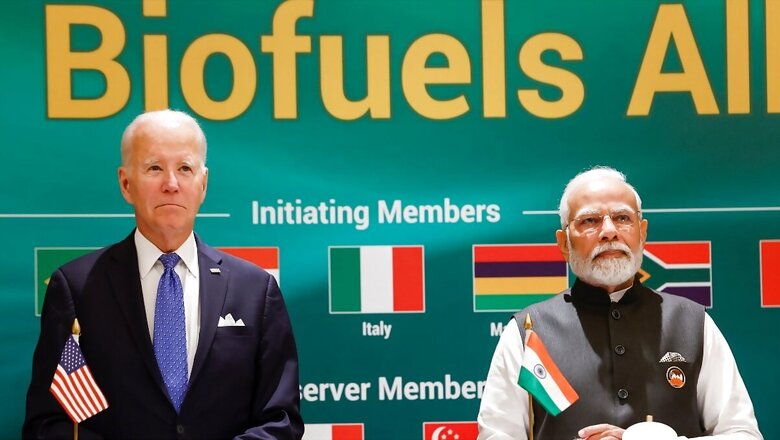
views
The strategic partnership between India and the United States runs on two parallel tracks. The first is collaborative and focused. The 2+2 dialogue between the foreign and defence ministers of the two countries, the Quad, joint naval exercises, quiet talks on critical and emerging technologies (iCET), defence purchases, and participation in annual G7 summits.
This year’s G7 summit is in Italy on June 13-15. Prime Minister Narendra Modi, as in past G7 summits, will attend as a special invitee. His meeting with US President Joe Biden will be of particular interest.
There is, however, a second parallel track, mostly out of the public eye, where conversations between India and the US-led West are strained. It began with Canadian Prime Minister Justin Trudeau announcing in Parliament on September 18, 2023, that authorities in Canada were investigating the role of “agents connected with the Indian government” in the murder on June 18, 2023, of Hardeep Singh Nijjar, a Khalistani separatist and local gangster.
Canada’s English-speaking cousins (Britain, Australia, New Zealand and the US) backed Trudeau’s charge. America had by then already arrested an Indian businessman Nikhil Gupta. Detained at Prague airport under US instructions and awaiting extradition, Gupta remains in a Czech jail.
India meanwhile denied Canada’s allegations of Nijjar’s murder and expelled 41 Canadian diplomats from India. Annoyed at the treatment meted out to Anglospheric Canada, the US unsealed an indictment against Nikhil Gupta in a New York court on November 30, 2023, on charges of murder-for-hire.
Cloak and Dagger
How Gupta was arrested reveals the borderline-legal methods the US and its European allies (in this case the Czech Republic) employ.
An investigation by The Washington Post published on April 29, 2024, reported: “US agents used their informant to persuade Gupta to travel to the Czech Republic for what he was led to believe would be a clandestine meeting with his American contact, according to officials familiar with the operation. Gupta arrived in Prague on June 30, 2023 — 11 days after Czech authorities, acting at the behest of US officials, had secretly issued an arrest warrant for him.
“As he exited Vaclav Havel Airport, Gupta was intercepted by Czech police, who ushered him into a vehicle in which two US federal agents were waiting, according to court filings submitted by Gupta’s family in India. He was questioned for hours while the car meandered around the city. His laptop was seized and his phone held to his face to unlock it.”
Between June and September 2023, US President Joe Biden hosted Prime Minister Narendra Modi first at a State visit to Washington, and then travelled to India for the successful G20 Summit held under India’s presidency.
Nikhil Gupta had by then been in a Czech jail without charge since June 30, 2023. Nijjar was murdered on June 18, 2023. Talks between India’s National Security Advisory (NSA) Ajit Doval and his US counterpart Jake Sullivan were ongoing through this period.
FBI director Christopher Wray made an unusual trip to India on December 11-12, 2023. It was the first visit to India by an FBI director in 12 years. In January 2024, Biden politely declined Modi’s invitation to be the chief guest at India’s Republic Day, citing a tight election schedule at home.
The US was by now distracted with the Gaza war and the continuing conflict in Ukraine. NSA Jake Sullivan twice postponed scheduled meetings in Delhi with Doval in February 2024 and again in April 2024.
The embedded US media
When the US wants to deliver a message to an ally that is not part of the Anglo-Saxon Five Eyes or the broader Western alliance, it uses newspapers like The Washington Post, The New York Times and The Wall Street Journal.
On April 29, 2024, The Washington Post published an investigative story. It wrote: “That India would pursue lethal operations in North America has stunned Western security officials. In some ways, however, it reflects a profound shift in geopolitics. After years of being treated as a second-tier player, India sees itself as a rising force in a new era of global competition, one that even the United States cannot afford to alienate.”
The newspaper claimed that an Indian operative identified by anonymous sources as Vikram Yadav, an officer in the Research and Analysis Wing (RAW), discussed the planned assassination of proscribed terrorist Gurpatwant Singh Pannun, noting his New York address.
The Washington Post added, again quoting anonymous sources: “Yadav’s identity and affiliation, which have not previously been reported, provide the most explicit evidence to date that the assassination plan — ultimately thwarted by US authorities — was directed from within the Indian spy service. Higher-ranking RAW officials have also been implicated, according to current and former Western security officials, as part of the sprawling investigation by the CIA, FBI and other agencies that has mapped potential links to Modi’s inner circle.
“In reports that have been closely held within the American government, US intelligence agencies have assessed that the operation targeting Pannun was approved by the RAW chief at the time, Samant Goel. That finding is consistent with accounts provided to The Washington Post by former senior Indian security officials who had knowledge of the operation and said Goel was under extreme pressure to eliminate the alleged threat of Sikh extremists overseas. US spy agencies have more tentatively assessed that Modi’s national security adviser, Ajit Doval, was probably aware of RAW’s plans to kill Sikh activists, but officials emphasised that no smoking gun proof has emerged.”
Track 2, track 1
While External Affairs Minister S. Jaishankar has been blunt while addressing Western annoyance with India’s neutrality in the Russia-Ukraine war, the Ministry of External Affairs (MEA) has largely maintained a diplomatic tone, even in the face of aggravations from mainstream US media and occasionally State Department spokespersons.
This changed last week when the MEA dismissed The Washington Post story, based entirely on anonymous officials in India and the US, with this terse comment: “Democracies should display understanding in regard to other democracies. After all, we are judged by what we do at home and not what we say abroad.”
The allusion was to the recent violence and polarisation that has undermined US democracy.
While punch and counter-punch was being exchanged in Washington and New Delhi, the first parallel track of the India-US strategic partnership proceeded at a stately pace. Washington is fully aware that India is an indispensable power in the West’s strategic contest with China.
Beijing is monitoring the India-US relationship. If it could drive a wedge in that strategic partnership, it would. But the US administration, alive to that possibility, will not let the relationship sour tactically beyond a point.
Nikhil Gupta meanwhile remains in Prague’s Pankrac Prison awaiting extradition to the US. Gurpatwant Singh Pannun, designated as a terrorist by India, travels freely under US protection between America and Canada.
The writer is an editor, author and publisher. Views expressed in the above piece are personal and solely those of the author. They do not necessarily reflect News18’s views.


















Comments
0 comment